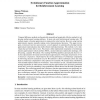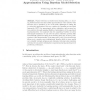38 search results - page 4 / 8 » Improving reinforcement learning function approximators via ... |
WSC
2008
14 years 3 days ago
2008
Reinforcement Learning (RL) is a simulation-based technique useful in solving Markov decision processes if their transition probabilities are not easily obtainable or if the probl...
CORR
2010
Springer
13 years 10 months ago
2010
Springer
Temporal difference methods are theoretically grounded and empirically effective methods for addressing reinforcement learning problems. In most real-world reinforcement learning ...
NIPS
1996
13 years 11 months ago
1996
Dynamic Programming, Q-learning and other discrete Markov Decision Process solvers can be applied to continuous d-dimensional state-spaces by quantizing the state space into an arr...
NIPS
2007
13 years 11 months ago
2007
Bayesian Reinforcement Learning has generated substantial interest recently, as it provides an elegant solution to the exploration-exploitation trade-off in reinforcement learning...
PKDD
2009
Springer
14 years 4 months ago
2009
Springer
Abstract. Feature selection in reinforcement learning (RL), i.e. choosing basis functions such that useful approximations of the unkown value function can be obtained, is one of th...


